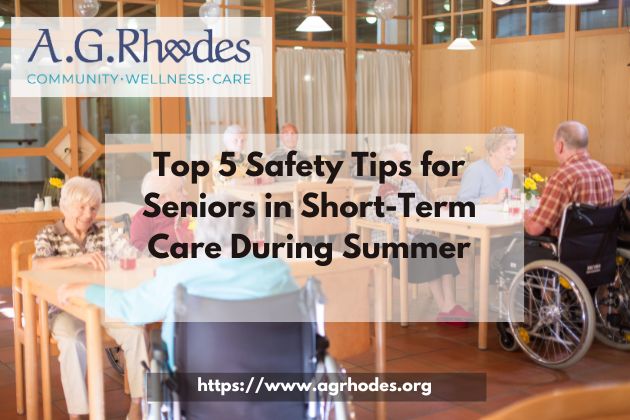 Summer brings warmth, sunshine, and longer days—but for seniors in short-term care, it also introduces specific health and safety challenges. At A.G. Rhodes, we are deeply committed to the well-being of older adults, especially during seasonal shifts that can put them at greater risk. Whether they’re recovering post-surgery, undergoing rehabilitation, or receiving respite care, it’s crucial to put proactive safety measures in place to ensure their comfort, health, and security.
Summer brings warmth, sunshine, and longer days—but for seniors in short-term care, it also introduces specific health and safety challenges. At A.G. Rhodes, we are deeply committed to the well-being of older adults, especially during seasonal shifts that can put them at greater risk. Whether they’re recovering post-surgery, undergoing rehabilitation, or receiving respite care, it’s crucial to put proactive safety measures in place to ensure their comfort, health, and security.
Below, we outline the top 5 summer safety tips for seniors in short-term care that can help reduce risks and promote well-being during the hotter months.
Stay Hydrated to Prevent Dehydration and Heat Stroke
Dehydration is one of the most common and dangerous threats to older adults in the summer. Seniors are less likely to feel thirsty and may have underlying health conditions or medications that affect their body’s ability to conserve water.
Best Practices:
- Encourage fluid intake throughout the day, even if the senior does not feel thirsty.
- Provide water-rich foods such as watermelon, cucumbers, and oranges.
- Avoid excessive caffeine and alcohol, which can dehydrate the body.
- Monitor for signs of dehydration such as dry mouth, confusion, dizziness, low urine output, and fatigue.
- Offer electrolyte-rich drinks (approved by a physician) for seniors with higher activity levels or special medical needs.
Monitor Room Temperatures and Avoid Direct Sun Exposure
Many seniors in short-term care are confined to their rooms or limited areas of a facility. While indoor safety may seem guaranteed, room temperature regulation is vital.
Prevent Overheating:
- Ensure air conditioning systems are functioning properly and thermostats are set between 68-74°F.
- Use light, breathable bedding and clothing to prevent overheating.
- Install blackout curtains or UV-reflective window coverings to reduce indoor heat gain.
- Schedule outdoor activities for early mornings or late evenings when temperatures are cooler.
- Use hats, umbrellas, or canopies for shade during any necessary outings.
Review Medications for Heat Sensitivity and Side Effects
Some prescription drugs can interfere with the body’s ability to regulate temperature, retain fluids, or respond to heat stress. These can include diuretics, beta-blockers, and medications for Parkinson’s or psychiatric conditions.
Protective Measures:
- Conduct a seasonal medication review with a pharmacist or physician.
- Be aware of photosensitivity risks—some medications can make the skin more prone to sunburns or rashes.
- Maintain a medication schedule with reminders to avoid missed doses in the heat of summer activity.
- Store medications in a cool, dry place to prevent degradation.
Prevent Slips and Falls Due to Summer Footwear or Outdoor Hazards
Footwear and environmental conditions can contribute to slip-and-fall accidents, especially during warm weather when footwear choices may shift to sandals or loose shoes.
Safety Recommendations:
- Encourage the use of non-slip, closed-toe footwear with firm arch support.
- Regularly inspect indoor and outdoor walking paths for water spills, cords, rugs, or changes in flooring levels.
- Use assistive devices such as walkers or canes that are properly fitted and in good condition.
- After rain or outdoor watering, ensure dry surfaces and clear paths before allowing outdoor access.
Monitor for Signs of Heat-Related Illnesses
Seniors may not always exhibit clear symptoms of heat distress, and heat-related illnesses can escalate quickly. Early recognition is key to prevention and care.
Heat-Related Conditions to Watch:
- Heat exhaustion: symptoms include heavy sweating, cold/clammy skin, weakness, nausea, and muscle cramps.
- Heat stroke: a medical emergency marked by body temperatures above 103°F, confusion, rapid pulse, and loss of consciousness.
- Sunburns: even minor burns can impair healing, especially in seniors with fragile or post-operative skin.
Preventive Actions:
- Use broad-spectrum sunscreen with SPF 30+ on all exposed areas.
- Reapply sunscreen every 2 hours if outdoors.
- Conduct regular wellness checks, especially during heatwaves or high humidity days.
- Have emergency protocols in place and ensure staff are trained to act immediately on any signs of heat distress.
Bonus Tip: Encourage Light Physical Activity with Adequate Supervision
Although staying active is important for physical and emotional health, summer heat can deter movement. Find a balance by promoting low-impact indoor exercises, such as:
- Chair yoga
- Stretching routines
- Light walking indoors with handrails
- Guided rehabilitation sessions
These activities help maintain mobility and circulation without exposing the individual to the stress of high temperatures.
A.G. Rhodes: Your Trusted Partner in Safe, Compassionate Short-Term Care
At A.G. Rhodes, we understand the specific challenges seniors face during the summer season. Our team of professional caregivers and healthcare staff work around the clock to ensure each resident in short-term care is safe, hydrated, comfortable, and engaged in a nurturing environment.
With our evidence-based safety practices, climate-controlled environments, and personalized care plans, we go the extra mile to support recovery and quality of life, no matter the season.
If you’re looking for compassionate and secure short-term care for a loved one this summer, connect with us at A.G. Rhodes and let us help make their healing journey safer and more comfortable.

